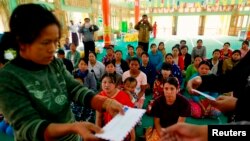Intense fighting between rebels and Myanmar’s army has forced thousands of people to flee across the border into China’s southern province Yunnan to seek shelter and safety. The conflict is raising concern here in China as officials repeatedly call for a cease-fire.
Over the past week, intense clashes between ethnic Kokang fighters and Myanmar’s, also known as Burma, military have left dozens dead. A statement released by an official Chinese provincial government website says there have been more than 30,000 trips recorded in and out of Myanmar’s northern Shan State since February 9.
Xinhua news agency quoted the statement as saying the Chinese side was providing those who have fled with aid and supplies, offering them food, medicine and quarantine services.
The numbers of displaced people appear to be about the same as the last time fighting was this intense in 2009 when Myanmar’s army launched an offensive against Kokang rebels.
One man surnamed Yang who runs a shop just across the border told VOA he felt there are just as many refugees in the area as there were in 2009.
Yang said that more than 10 of his family and relatives have fled across the border and that they just arrived last night. He added that many Chinese who work across the border and others have also returned and are waiting for the conflict to settle.
Speaking at a regular press briefing on Tuesday, China’s Foreign Ministry spokeswoman Hua Chunying said that China is calling “on all sides involved in the conflict to exercise restraint and avoid escalating the situation further to ensure peace and stability of the border, and especially to avoid affecting security on the Chinese side.”
In an editorial on Monday, the Communist Party backed Global Times said that peace in northern Myanmar was imperative for China. The editorial noted that since the Kokang people are considered ethnic Chinese, it has “drawn heightened public attention” and some are mistakenly drawing comparisons between the conflict and Russia’s struggle with Ukraine over Crimea.
The editorial went on to say that China is now faced with a diplomatic challenge. It urged varied factions in Chinese society to avoid interfering in northern Myanmar affairs.
Still, a debate about the conflict is heating up online, with some commentators calling China “the motherland” of the ethnic Kokang people.
Bloody images allegedly from the conflict that appeared to show dead ethnic Kokang in the streets circulated briefly before censors took them down.
One removed post that included a photo of three bodies in the street piled on top of another could still be seen on the website Freeweibo.com, which retains censored Chinese social media posts. It urged the Beijing government to step up and take action to stop the massacre of Chinese, regardless of who is right and who is wrong.
The authenticity of the graphic images could not be independently verified.
Another post criticized the Foreign Ministry’s stance on the issue, asking: "How can one expect Chinese enterprises to go out into the world and support government trade polices such as the Maritime Silk Road and New Silk Road, when you can’t even take care of situations on your own doorstep?"
It went on to suggest authorities are not doing enough to help those Chinese who may be caught up in the violence.
Officials in Myanmar have blamed Kokang rebel leader Phone Kya Shin or Peng Jiasheng as he is called in Mandarin Chinese for the recent surge in fighting. Authorities have called on their counterparts in China to stop anyone who might be helping him from the Chinese side of the border.
Phone was ousted in 2009 when his then deputy sided with the Myanmar’s military. Since then he fled into exile, analysts say, only to recently return to the area and rally up a force estimated at more than 1,000 rebel forces.
Myanmar’s government has been working to establish a nationwide cease-fire with rebel groups ahead as it prepares for nationwide elections later this year.




